Record & Share Like a Pro
Free Screen Recording Tool
Made with ❤️ by developers at Codersera, forever free
4 min to read
To learn the rust language you first know what is rust language.
It is a multi-paradigm system programming language, whose main focus is on safety. Safety of documents or the data of the application. It is a new build and less used programming language the only purpose is to save the memories in it. The rust language is designed to maintain the high performance of the application and save its memory of it. It is for a highly concurrent and safe system.
The rust language is oriented from C++ as well as it includes Haskell and OCaml-like languages.
Step 1. Type “Hello World” in rust.

In this step, you see that it is similar to the C language, the function key (fn) in the keyword is optional as well as the curly braces ({}) delineate the function, whereas the function consists of a call to the (println!) macro.
The code we use in Rust is a reusable code via modules.
It organizes code as a package that others can use.
The three things that you should note while using modules you can these are the elements of modules:
Step 2. Create a module in Rust.
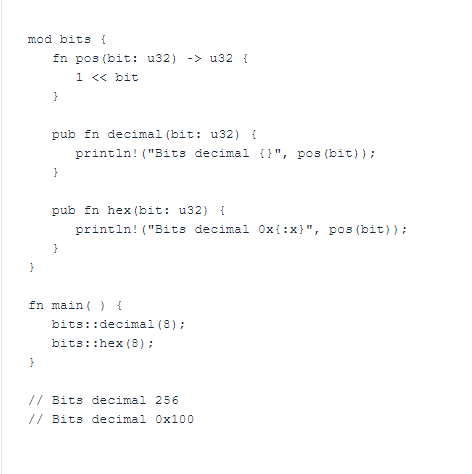
In the module, this value is called by two public functions decimal and hex, as well as these functions call the private pos function and print the value of the bit position in decimal and hexadecimal format. The best thing that the module gives you is the function of selecting your audience- private or public, as well as it’s a safe method to secure your program.
Next is safety,
The safety checks for cleaner code:
Rust compiler enforces memory save in it.
To understand the safety of rust here, unsafe program.
Step 3. Unsafe program in Rust.
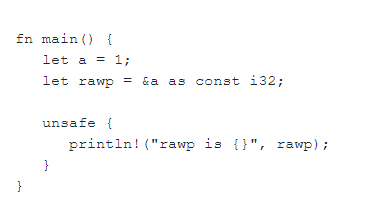
Here you can apply the unsafe keyword to function as well as block the code with the rust program. This feature makes the rust very useful for operating system development as well as embedded (bare-metal) programming.
As you know, the error is the best friend of the developers they come along with the codes, but rust has two types of errors –
First, in step 4, we talk about uncovered errors, The Panic!!! , here we also can say it’s rust panic attack to us but it is easy to remove.
Step 4. Handle the unrecoverable errors in Rust

In the above figure, you can see the error, that the rust indicates in line 2 as well as provide you with a message regarding your error. One more thing that you do is generate a stack backtrace by running with a variable called RUST_BACKTRACE.
After this step let’s talk about the recoverable errors, that how to recover the errors in the rust.
Step 5. Handle recoverable errors with result in rust.
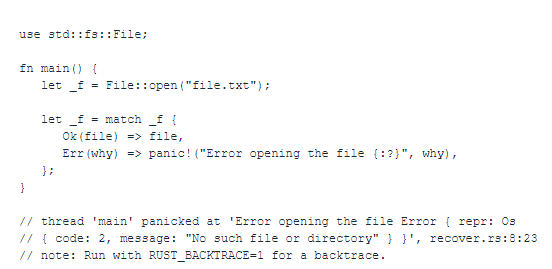
Happy now the errors are all recovered in step when you use the result enum; rust uses match. In this step, you find the rust recovers all the errors from the program which are shown in the above figure.
Step 6. Threads in Rust.
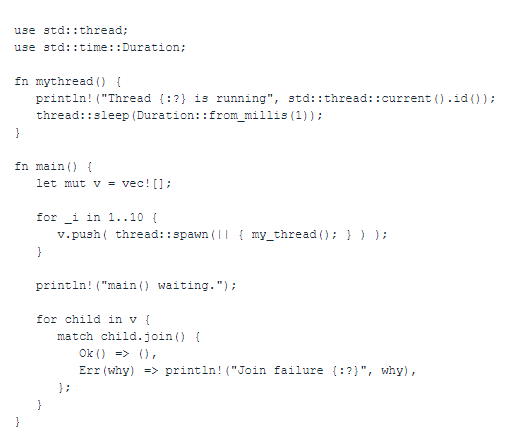
The main thread continued to execute until the join process in rust had begun as well as the threads then execute and exited at different times to identify the asynchronous of the thread.
Step 7. Thread output.
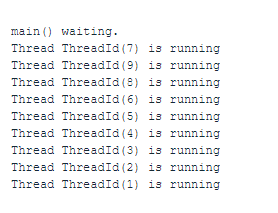
It is the last but the most important step of the rust program, the rust includes several popular and useful data structures as well as it includes four types of data structures: sequences, maps, sets, and a miscellaneous type that support the complex data types.
# Hence, there are seven steps to learn Rust in 5 mins.
Ans- Rust does not have a runtime: Requiring a runtime limits the utility of the language, and makes it undeserving of the title "systems language". All Rust code should need to run is a stack. Instead, the language focuses on enforcing memory safety through its type system.
Ans- Under this definition, then, Rust is object-oriented: structs and enums have data and impl blocks provide methods on structs and enums. Even though structs and enums with methods aren't called objects, they provide the same functionality, under the Gang of Four's definition of objects.
Need expert guidance? Connect with a top Codersera professional today!